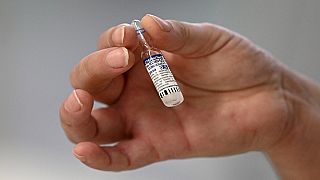Africa
Africa has surpassed 100,000 confirmed deaths from COVID-19 as the continent praised for its early response to the pandemic now struggles with a dangerous resurgence and medical oxygen often runs desperately short.
“We are more vulnerable than we thought,'' the director of the Africa Centers for Disease Control and Prevention, John Nkengasong, told The Associated Press in an interview reflecting on the pandemic and a milestone he called “remarkably painful.''
He worried that “we are beginning to normalize deaths,'' while health workers are overwhelmed.
The 54-nation continent of some 1.3 billion people has barely seen the arrival of large-scale supplies of COVID-19 vaccines, but a variant of the virus dominant in South Africa is already posing a challenge to vaccination efforts. Still, if doses are available, the continent should be able to vaccinate 35% to 40% of its population before the end of 2021 and 60% by the end of 2022, Nkengasong said.
Health officials who breathed a sigh of relief last year when African countries did not see a huge number of COVID-19 deaths are now reporting a jump in fatalities. The Africa CDC on Friday said overall deaths are at 100,294.
Deaths from COVID-19 increased by 40% in Africa in the past month compared to the previous month, the World Health Organization's Africa chief, Matshidiso Moeti, told reporters last week. That's more than 22,000 people dying in the past four weeks.
The increase is a “tragic warning that health workers and health systems in many countries in Africa are dangerously overstretched,'' she said, and preventing severe cases and hospitalizations is crucial.
But the latest trend shows a slowdown. In the week ending on Sunday, the continent saw a 28% decrease in deaths, the Africa CDC said Thursday.
Africa has reached 100,000 confirmed deaths shortly after marking a year since the first coronavirus infection was confirmed on the continent, in Egypt on Feb. 14, 2020.
But many more people across Africa have died of COVID-19, even though they are not included in the official toll.
South Africa, the hardest-hit country on the continent, saw over 125,000 excess deaths from natural causes between May 3 and Jan. 23. While it is not clear how many were from the virus, there was a “close correspondence of the time of the excess deaths with the increases in confirmed COVID-19 cases in each province,'' the South African Medical Research Council said.
Since most countries in Africa lack the means to track mortality data, it is not clear how many excess deaths have occurred across the continent since the pandemic began.
“We are definitely not counting all the deaths, especially in the second wave,'' the Africa CDC's Nkengasong told reporters last week.
While the continent is not seeing a “massive'' number of deaths, he asserted that most people in Africa now know someone who has died of COVID-19. “People are dying because of a lack of basic care,'' he said, citing medical oxygen as a critical need.
Twenty-one countries in Africa now have case fatality rates that are higher than the global average, Nkengasong said, including Sudan, Egypt, Liberia, Mali and Zimbabwe. The case fatality rate continent-wide remains higher than the global average at 2.6%.
Vaccine divide
The United Nations chief on Wednesday sharply criticised the “wildly uneven and unfair” distribution of COVID-19 vaccines, pointing out that just 10 countries have administered 75 percent of all vaccinations.
Addressing a high-level meeting of the UN Security Council on Wednesday, Antonio Guterres said 130 countries have not received a single dose of vaccine.
“At this critical moment, vaccine equity is the biggest moral test before the global community,” he said.
Only a handful of countries in Africa have begun inoculations. South Africa and Zimbabwe kickstarted their vaccination campaigns this week, with frontline health workers and leaders the first to receive the jabs, while Rwanda began inoculations last week.
According to a vaccine distribution forecast by Gavi, many countries on the continent will only receive initial vaccine doses from late February to early March.
AP











01:16
Africa mourns Pope Francis, a voice for peace and justice
01:14
ECOWAS Meets in Ghana to Tackle Member Withdrawals
01:02
WHO member countries draft landmark preparedness treaty for next pandemic
Go to video
EU foreign ministers discuss Ukraine, Syria and EU-African relations in Luxembourg.
01:58
Latin American leaders urge unity amid U.S. trade and migration tensions
Go to video
Paris hosts the 4th edition of African Cinema Days featuring Côte d'Ivoire